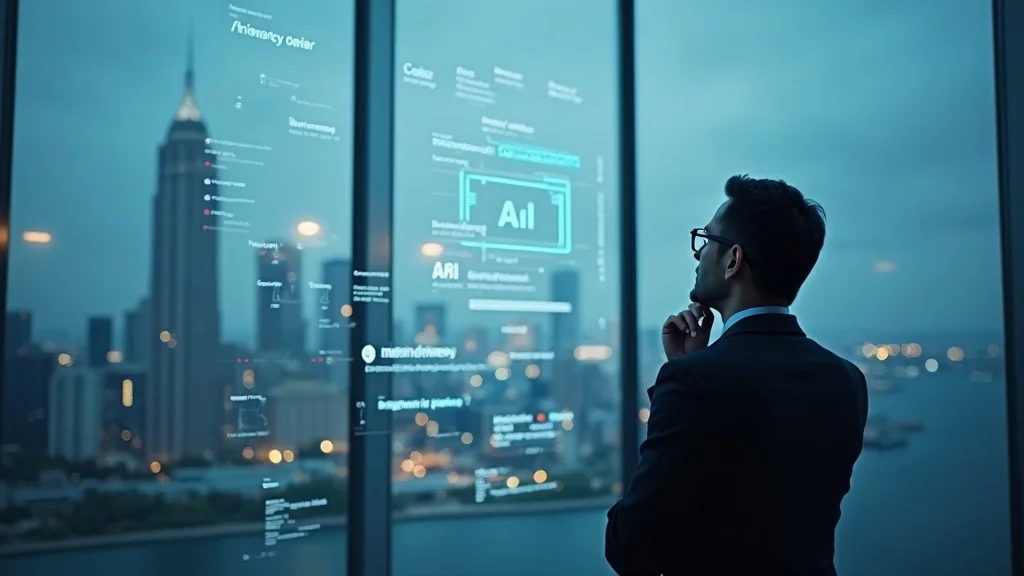Did you know that by 2025, over 80% of customer interactions will be managed by AI agents? This extraordinary shift isn’t just a distant prediction. It’s happening now and is set to change the DNA of hospitality and customer service forever—redefining convenience, speed, and what customers expect every time they engage with a brand. Whether you’re checking into a hotel or contacting a support center, artificial intelligence is rewriting the rules of engagement. Get ready to discover how AI in customer service is not just reshaping customer experience, but creating new benchmarks for satisfaction, efficiency, and the future of human roles in this rapidly evolving landscape.
A Startling Shift: How AI Is Transforming Customer Service in 2025
"By 2025, over 80% of customer interactions will be managed by AI agents—changing the DNA of hospitality forever."

The customer service world is seeing a dramatic transformation with AI at its core. In 2025, AI agents are now managing the majority of customer interactions, offering not only quicker responses but also personalized experiences at scale. Traditional wait times are becoming a thing of the past as customers engage with intelligent virtual agents that resolve issues faster and offer support around the clock. This emerging trend isn’t just about replacing the human agent; it’s about giving them space to focus on complex support tasks that require empathy, creativity, and deeper understanding.
As businesses in hospitality and other service industries integrate AI in customer service, customers expect instant help, proactive recommendations, and seamless service on every channel. Modern systems powered by machine learning and natural language processing analyze queries in real time, directing requests to the most capable resource—human or AI—to maximize satisfaction. Meanwhile, companies benefit from lower routine workloads and boosted service quality. These advances mean AI isn’t just a back-end tool; it’s front and center, reshaping customer interactions and challenging what customers believe service should be in 2025.
The Unprecedented Rise of AI Agents in Customer Service
AI agents have moved from being simple chatbots to highly capable assistants thanks to innovations in artificial intelligence. In 2025, these agents are not only handling basic routine tasks but also dealing with inquiries that require real intelligence, like troubleshooting accounts, tracking deliveries, or even offering tailored product recommendations.
The change is visible everywhere. Hotels deploy AI virtual agents on kiosks and mobile apps, drastically cutting response times and errors. Contact centers use AI to triage queries so complex issues go directly to trained human agents, while standard requests are handled automatically. Such hybrid systems reflect a new understanding: AI in customer service complements, rather than competes with, the irreplaceable qualities of human agents.
Reimagining Customer Experience Through AI in Customer Service
The AI revolution isn’t just about doing things faster; it’s about doing them smarter. AI agents make service feel “custom-built” for every customer, whether it means remembering previous preferences, suggesting personalized upgrades, or knowing when to involve a human agent for sensitive matters. Intelligent sentiment analysis tools enable these systems to pick up subtle cues in customer language, tone, and even emotion, enabling businesses to resolve problems before they escalate.
What does this mean for the customer experience? Instead of feeling like another number in a queue, customers enjoy proactive engagement, smoother processes, and a hospitality experience that feels thoughtful at every turn. As artificial intelligence grows more advanced, it enables brands to deliver on the promise of true personalization while maintaining consistency and speed across every point of contact.
Why 2025 Is a Turning Point for AI in Customer Interactions
2025 marks a tipping point: advances in generative AI, scalable cloud computing, and big data analytics have matured, making sophisticated AI tools accessible to businesses of all sizes. As regulations and public sentiment align behind responsible AI, companies can now safely deploy powerful AI agents that understand context, manage complex workflows, and genuinely enhance the service journey.
There’s also pressure from customers themselves. Modern consumers are digital natives who expect near-instant gratification, tailored recommendations, and effortless service. If a hospitality brand fails to deliver—say, by relying on slow, outdated contact centers—customers will switch to competitors with more advanced AI in customer service capabilities. This environment is driving rapid adoption and accelerating the evolution of how businesses manage every customer interaction.
What You’ll Learn in This Exploration of How AI Is Redefining Customer Service in 2025
- Key AI trends shaping customer service in 2025
- The impact of AI agents on customer experience
- The balance between automation and human interaction
- How contact centers are navigating the AI revolution
- Expert opinions on the trajectory of AI in customer service

The Evolution of Customer Service: From Human Touch to AI Agents
Important Milestones in AI in Customer Service
- Emergence of virtual agents
- Advances in sentiment analysis
- Deployment of AI-driven knowledge bases
- AI agents handling routine tasks
For decades, customer service was rooted in the human connection—a warm voice at the other end of the line or a helpful smile at the reception desk. The first big milestone arrived with the birth of virtual agents, which used simple rules to answer FAQs and lighten the load for human agents. As these systems improved, advances in sentiment analysis and natural language processing made it possible for AI agents to understand complex questions and take action.
By 2025, AI-driven knowledge bases empower customer service teams to resolve issues faster than ever before. Routine tasks—like checking account balances or making reservations—are now fully automated, letting human agents focus on empathy-driven connections and resolving complex problems that truly need a human touch. AI’s rapid evolution is fundamentally reshaping customer expectations and raising the standard for what businesses must deliver.
Contact Centers Adapting to AI in Customer Interactions
"AI is not replacing human agents, but empowering them to focus on empathy-driven tasks." – Leading AI Expert

Contact centers have become the proving ground for AI in customer service. As virtual agents take over repetitive and high-volume tasks, the human workforce is repositioned to handle nuanced customer needs and build stronger relationships. Contact center managers now prioritize training that builds empathy, adaptability, and collaboration—skills that AI cannot yet replicate.
New hybrid workflows ensure that customers never get “stuck” with an AI agent that can’t solve their issue—instead, queries escalate seamlessly to human agents when deeper insight is needed. This balance between automation and personal service is helping businesses keep both customers and employees happy, reducing burnout, and improving overall service quality in a fast-paced, digital world.
How AI Agents Are Enhancing Customer Experience in 2025
Role of AI in Customer Service: Speed, Personalization, Efficiency
At the heart of AI in customer service is a promise: to deliver incredible speed, seamless personalization, and operational efficiency. Modern AI agents now analyze customer histories in real-time, make personalized suggestions, and offer lightning-fast support. Whether it’s instantly retrieving a loyalty member’s booking info or offering a custom upgrade, AI enables support staff to focus energy where it matters most—on personalized interaction and empathetic support.
Automation doesn’t mean sacrificing quality. In fact, with AI taking care of repetitive tasks, businesses see faster response times, fewer errors, and higher customer satisfaction. Personalization—once a “nice to have”—is quickly becoming the norm. Customers now expect every service, from chat to phone to in-person, to not only meet but anticipate their needs thanks to artificial intelligence working behind the scenes.
Sentiment Analysis: Understanding Emotions at Scale

Sentiment analysis is a game-changer for hospitality and contact centers. Using natural language processing and machine learning, today’s AI agents can interpret emotion from text, speech, or even facial expressions—at incredible speed and scale. This means businesses can measure customer happiness in real time and take proactive steps to prevent escalations or resolve issues quickly.
For example, if a guest leaves a negative comment about their stay, the AI flags and categorizes the tone, prompting a human agent to reach out with a tailored solution. This new awareness helps organizations improve service quality, personalize recovery efforts, and foster lasting loyalty in ways human agents alone couldn’t manage at such scale.
The Integration of AI Agents in Omni-Channel Customer Experience
| Traditional Customer Service | AI-Enhanced Customer Service |
|---|---|
| Limited scalability | Scalable 24/7 support |
| Reactive responses | Proactive outreach |
| Human-driven | Hybrid human and AI agents |
| Routine task overload | Automation of routine tasks |
| General knowledge base | Dynamic AI-powered knowledge base |
AI-powered customer service doesn’t just live in one channel. A single customer can shift effortlessly from web chat to phone support to face-to-face interaction, with their preferences and activity synced at every step. AI ensures there’s never a disconnect or repetition—and that both virtual and human agents are up to speed instantly.
This omni-channel integration guarantees smoother customer journeys and better business outcomes. Customers no longer need to repeat details; their history and context are always available, resulting in much higher service quality and satisfaction—even when moving between automated and human support.
Contact Center Reinvention: AI Agents as the New Standard
How AI in Customer Service Is Shaping Modern Contact Centers

Modern contact centers operate as “centers of excellence” thanks to AI in customer service. AI agents diligently handle thousands of inquiries simultaneously, freeing their human colleagues to work on higher-level tasks like resolving complex issues and nurturing customer relationships. This shift lowers average wait times and enables organizations to exceed—even redefine—expectations for speed and service quality.
By leveraging automation, contact centers are not only reducing burnout and attrition among staff but also improving consistency in every customer interaction. AI supports ongoing staff development, offering learning recommendations, and analyzing performance to highlight areas where service quality can continually improve.
Virtual Agents vs. Human Agents: A Comparative View
| Criteria | AI Agents | Human Agents |
|---|---|---|
| Response Time | Instantaneous | Variable |
| Complex Problem Solving | Limited | High |
| Empathy | Emerging | Strong |
| Routine Tasks | Automated | Manual |
The strengths of virtual agents and human agents are now more complementary than ever. AI agents offer instantaneous response times, data-driven accuracy, and the ability to handle repetitive or high-frequency queries across time zones. However, when it comes to complex problems, creative solutions, and deep empathy, human agents deliver far more value.
The result isn’t a “versus” battle, but a new standard of collaboration. Virtual agents pave the way with speed and scale, while humans step forward when the situation calls for heart, judgment, and adaptability—qualities fundamental to the future of customer experience in hospitality and beyond.
Knowledge Bases in the Era of AI in Customer Interactions
Knowledge bases have always been foundational to customer service, but their role is now supercharged by artificial intelligence. In 2025, an AI-powered knowledge base instantly searches, updates, and suggests relevant information to both customers and agents. This minimizes research time and maximizes first-contact resolution.
Modern knowledge bases don’t just store data—they use machine learning to refine answers, highlight common questions, and predict what information a customer might need next. This dynamic, always-evolving resource dramatically boosts efficiency and consistency, giving every agent—human or virtual—the tools to deliver exceptional support.
The Human Element: Can AI Truly Redefine Customer Service in 2025?
Routine Tasks and the New Role of Human Agents

As AI takes over routine tasks, human agents are now focusing on more meaningful connections with customers. No algorithm can truly replace a warm smile or the ability to make a guest feel genuinely heard in a moment of need. In hospitality, for instance, human agents focus on conflict resolution, guest recovery, and personalized recommendations—turning ordinary moments into memorable experiences.
These “human-first” touchpoints become crucial brand differentiators. AI handles the background noise; humans provide the substance and comfort, especially when customer emotions are high or issues are sensitive, reinforcing that hospitality is more than just automation.
AI Agents: Augmentation, Not Replacement
"The future of customer experience is symbiotic—AI and humans working in concert."
Despite rapid advances in AI in customer service, the vision for 2025 is not about robots replacing jobs, but about symbiosis. AI agents augment what human agents do, making their jobs less stressful and more impactful. Employees can finally concentrate on work that requires empathy and understanding, while AI works tirelessly in the background, reducing bottlenecks and ensuring that no request goes unnoticed.
Businesses that embrace this hybrid approach are finding that they can support more customers, deliver faster response, and improve loyalty—all while cultivating a happier, more engaged workforce. The future is not about choosing between man or machine, but about orchestrating their strengths to create unbeatable customer experiences.
Challenges and Opportunities for Customer Service Jobs
Of course, this transformation presents unique challenges as well. Reskilling and upskilling are now top priorities for the workforce. While some routine roles will shift or phase out, new jobs in customer analytics, AI supervision, and relationship management are emerging. Companies must commit to ongoing training and support for human agents—ensuring they remain indispensable contributors to reshaping customer experience.
For those willing to adapt, the opportunity is enormous: human agents become true brand ambassadors, trusted not just for their knowledge, but for their caring approach and creative problem-solving. The combination of technology and humanity sets a new bar for what customer service can—and should—be as we move deeper into the AI era.
Industry Use Cases: Real-World Examples of AI Agents in Customer Service

- Hotel concierge chatbots delivering instant service
- AI in customer handling booking modifications
- Retail contact center AI agents for product recommendations
- Travel sector sentiment analysis optimizing customer interactions
Success Stories: How Companies Are Leveraging AI in Customer Experience
"AI-driven knowledge bases have reduced customer wait times by up to 75%."
Major hotel brands have adopted chatbot concierges that give guests instant directions, amenity bookings, and personalized activity suggestions—cutting down lobby wait times and boosting positive reviews. Airlines and booking platforms use AI to automate ticket changes and answer frequent travel questions, even during high-volume periods.
In the retail sector, AI agents are responsible for recommending products based on browsing history, mood, and even trends in sentiment analysis. These swift, context-aware interactions mean companies can resolve issues and deliver value at record pace, delighting customers and freeing up human agents for high-impact service opportunities.
People Also Ask: How AI Is Redefining Customer Service in 2025

What is the future of customer service with AI?
The future of customer service with AI is all about blending speed, precision, and empathy. AI will handle the bulk of routine queries and transactions, using advanced learning to adapt and improve over time. At the same time, human agents will center their focus on customers’ unique needs, using technology as a tool for better personalization and stronger relationship-building. In 2025 and beyond, customer expectations will revolve around seamless, omni-channel experiences powered by both human and artificial intelligence.
What are the customer support trends in 2025?
In 2025, key customer support trends include the widespread use of AI-powered chatbots, real-time sentiment analysis, and predictive analytics for customer needs. There’s also an increased focus on omni-channel integration, blending self-service with warm hand-offs to human agents. Businesses are investing more in continuous training for agents and deploying AI-driven knowledge bases so customers can resolve issues independently—or connect with skilled support fast when necessary.
How will AI change in 2025?
AI in 2025 will be more context-aware, capable of deeper understanding, and highly scalable. Generative AI will drive even more natural language conversations, enabling agents to handle nuanced requests and offer proactive solutions. AI systems will also be more ethical and transparent, with built-in safeguards for privacy and data protection, ensuring customers feel secure while enjoying superior service experiences.
Are customer service jobs being replaced by AI?
AI is automating many repetitive and routine tasks, but it is not replacing customer service jobs overall. Instead, roles are evolving—the need for empathy, creative problem-solving, and complex support is greater than ever and is best handled by skilled human agents. As AI takes on more administrative duties, new opportunities arise for agents to provide value that machines cannot—reinforcing the importance of the human element in every customer interaction.
FAQs on How AI Is Redefining Customer Service in 2025
-
How do AI agents learn and adapt in customer service roles?
AI agents are powered by advanced machine learning algorithms. They learn from ongoing customer interactions, improving with each new experience and constantly updating their approaches based on collected data. -
What industries are leading in AI adoption for customer interactions?
Hospitality, retail, airlines, and contact center operations are at the forefront of AI adoption. They leverage AI to enhance response speed, personalize recommendations, and automate booking and support tasks. -
Are AI-driven knowledge bases secure and private?
Yes, leading AI-driven knowledge bases use encryption, strict privacy protocols, and frequent auditing to keep customer information secure and private, adhering to global data protection standards. -
How can businesses balance automation with personal touch?
The most successful companies use AI for efficiency, delegating basic and repetitive tasks while retaining human agents for complex, emotionally charged, or high-value interactions—striking a balance that delights customers.
Key Takeaways: How AI Is Revolutionizing Customer Experience and Customer Interactions
- AI agents are transforming customer service operations in 2025.
- Contact centers benefit from automation and advanced sentiment analysis.
- Human and AI collaboration will define the new standard in customer experience.
- Personalization and efficiency are driving customer interactions forward.
Final Thoughts on How AI Is Redefining Customer Service in 2025
The Continuing Journey of AI in Customer Service
The story of AI in customer service is just beginning. With every breakthrough in machine learning and automation, brands unlock new possibilities to surprise and delight customers—setting the stage for a more intuitive, responsive, and satisfying hospitality experience.
Why the Human Touch Still Matters
Even as AI grows smarter, nothing replaces the warmth and creativity of human connection. The best service experiences of 2025 will come from businesses where AI and humans work together, perfectly balanced, to put the customer first.
Ready to Embrace AI? Call today for all AI automation needs at (843) 997-1127. We are here to help you.
In 2025, artificial intelligence is revolutionizing customer service by enhancing efficiency, personalization, and overall customer satisfaction. For instance, Salesforce has implemented its AI platform, Agentforce, to manage approximately 1.5 million customer interactions, leading to a reduction of nearly 4,000 support positions while maintaining high customer satisfaction scores. (itpro.com) Similarly, Lyft’s collaboration with Anthropic has introduced AI tools that have decreased average customer service resolution times by 87%, demonstrating AI’s capacity to streamline operations and improve response times. (reuters.com) These developments highlight AI’s transformative role in redefining customer service standards, offering faster, more personalized, and efficient support experiences.
 Add Row
Add Row  Add
Add 




Write A Comment